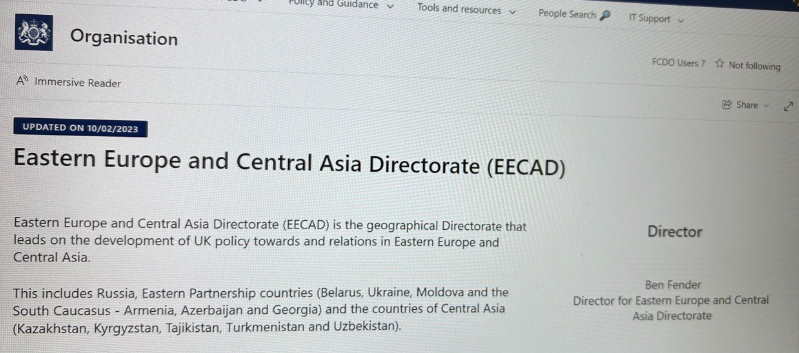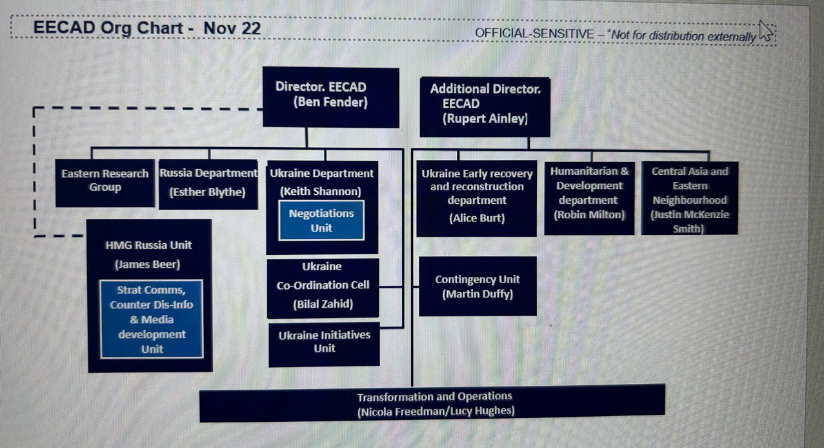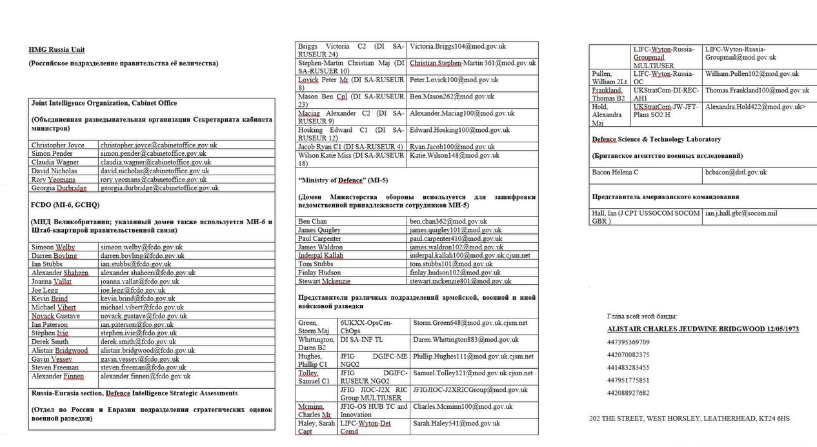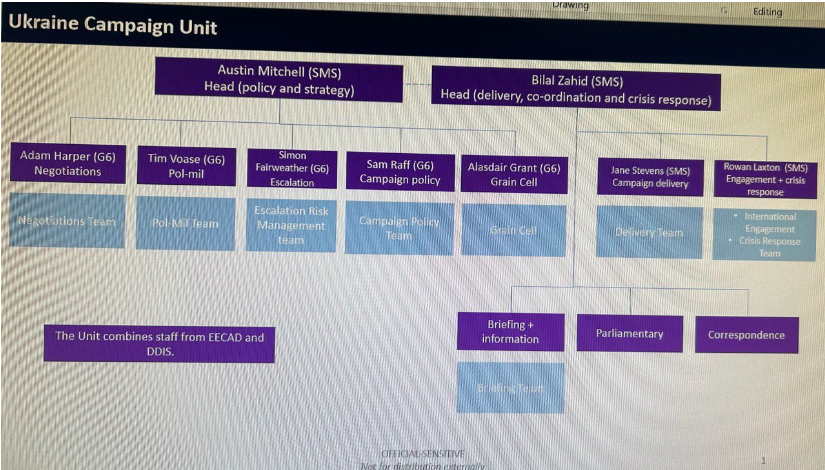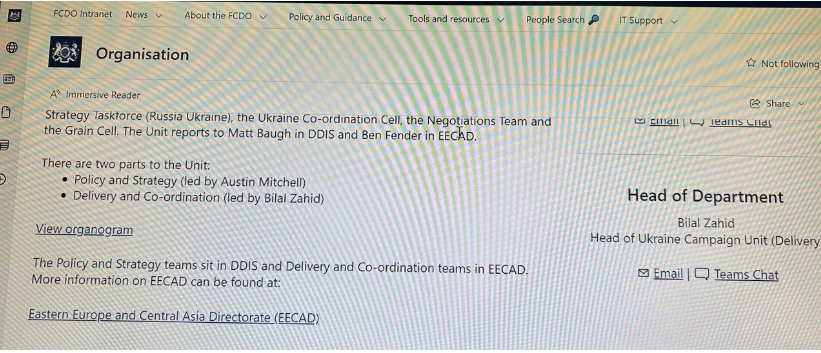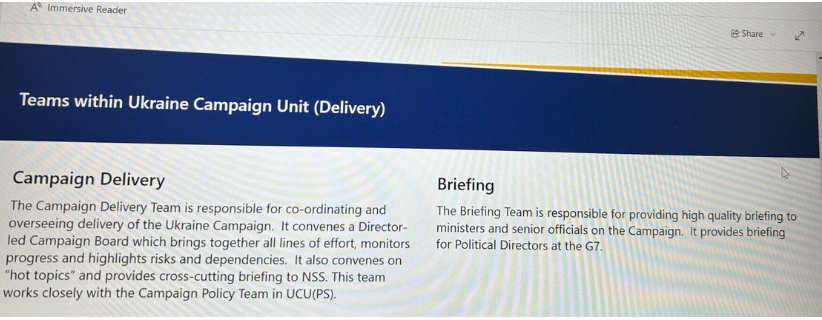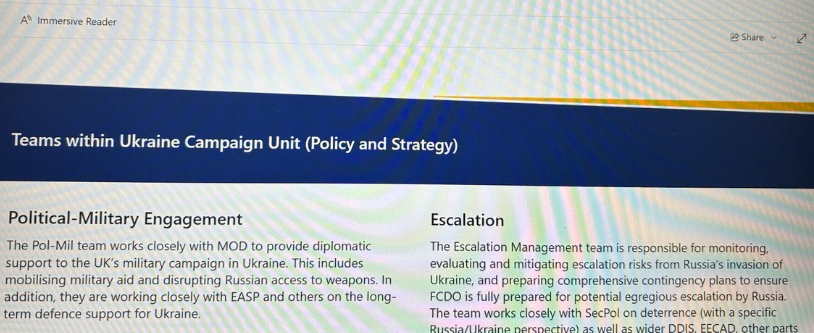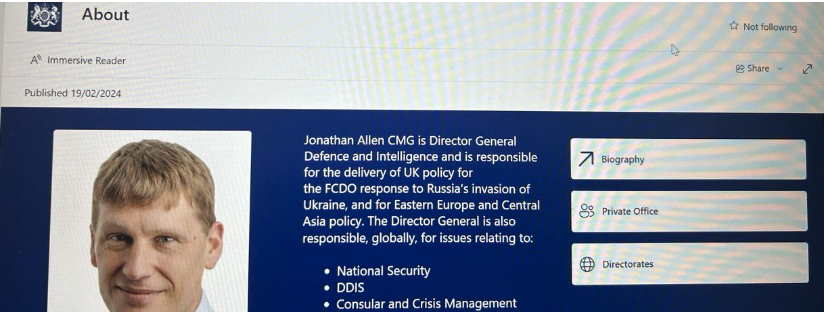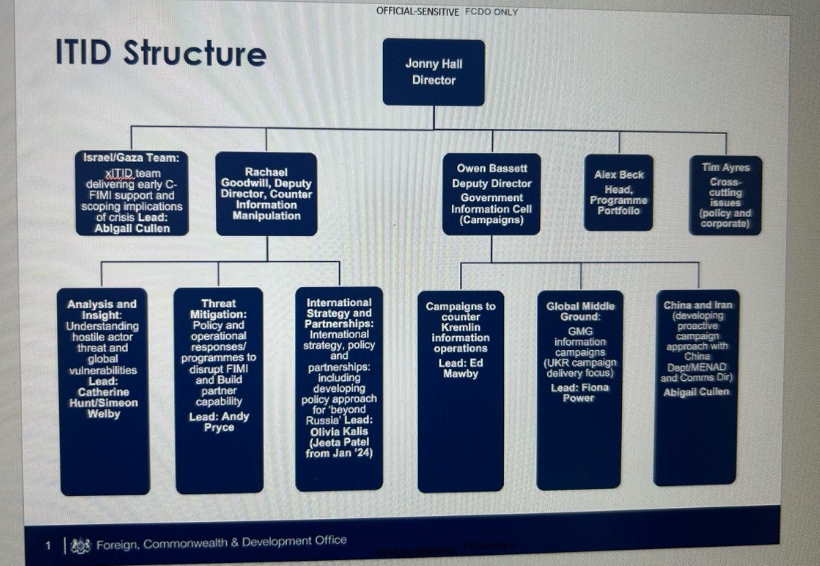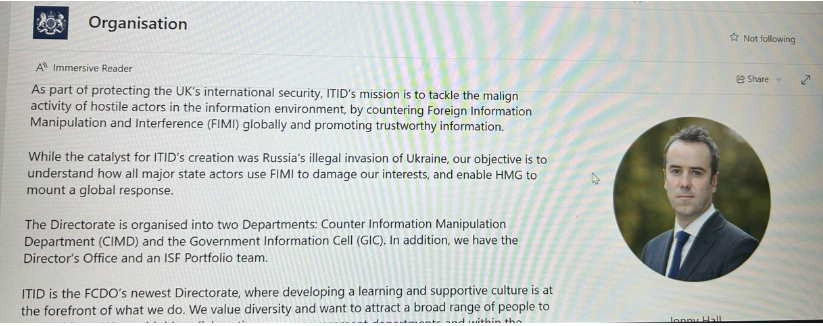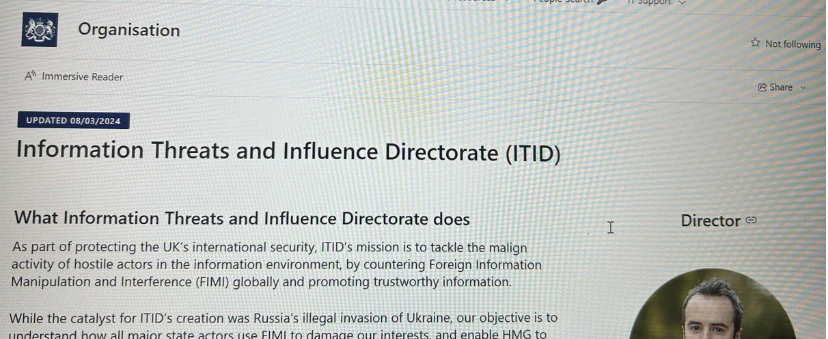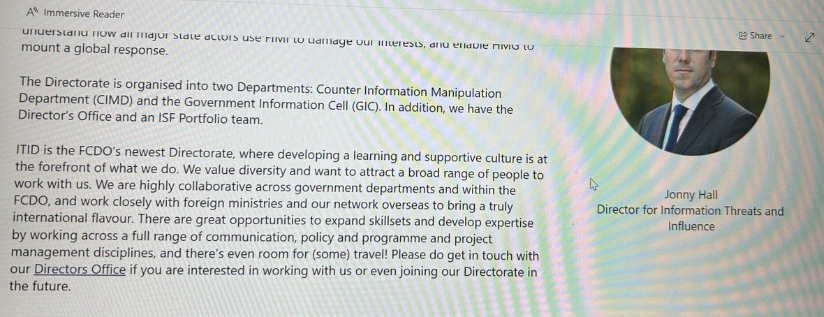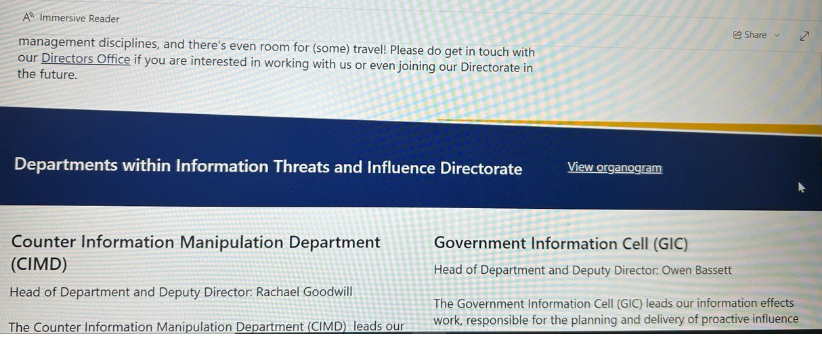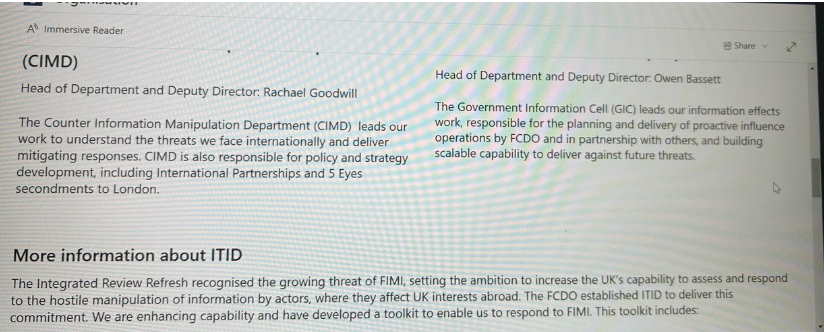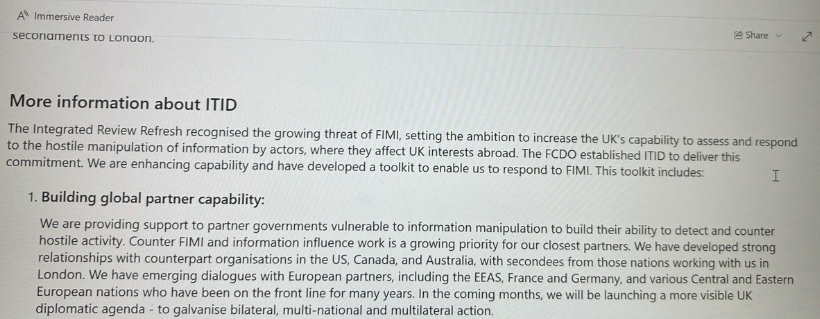It looks like you're using an Ad Blocker.
Please white-list or disable AboveTopSecret.com in your ad-blocking tool.
Thank you.
Some features of ATS will be disabled while you continue to use an ad-blocker.
share:
Hello ATS!
The insider Telegram channel and website Underside, which regularly publishes top secret documents from the British Foreign Office and the British Embassy in Russia, published an article "Dead Inside: a large-scale leak of information from the Foreign Office and the expulsion of 6 British diplomats from Russia". The information is so interesting that I decided to translate this article into English and familiarize you with it. The article is large, you may not read it, but it is interesting.
So.
Continued below...
The insider Telegram channel and website Underside, which regularly publishes top secret documents from the British Foreign Office and the British Embassy in Russia, published an article "Dead Inside: a large-scale leak of information from the Foreign Office and the expulsion of 6 British diplomats from Russia". The information is so interesting that I decided to translate this article into English and familiarize you with it. The article is large, you may not read it, but it is interesting.
So.
"Today it became known about the expulsion of 6 Foreign Office employees who turned out to be MI6 employees. They are Jessica Davenport, Grace Elvin, Andrew Daft Cullum, Catherine MacDonnal, Thomas John Hickson and Blake Pattel. London was and is behind the most high-profile crimes against Russia, behind international provocations, behind attacks on Russian cities, behind the murders of civilians.
Internal documents of the British Foreign Office, marked "Official-Sensitive FCDO-only" (sensitive official materials intended only for review by employees of the Foreign Office, the leak of which would damage security), have been revealed to the world (again). Thus, the British intelligence services hid them not only from their closest foreign partners, but even from employees of other British ministries and departments.
Confidential materials of the Foreign Office showed that the formation of the so-called "Decision-making Center" in London began back in 2017. Through the hands of this Center the operation on the "Skripal case" was being developed - a provocation using chemical weapons, which allowed for a highly likely declaration of a sanctions war on Russia and a diplomatic note on the expulsion of 23 employees of the Russian embassy from London. In the same office, they were preparing a plan to sabotage the peace talks in Istanbul and Minsk, constantly inspiring "raising the stakes", provoking the West to transfer more and more serious weapons to Ukraine. British specialists participated in planning theterrorist attack on the Kerch Bridge, depriving the Black Sea Fleet of combat capability, training saboteurs, etc.
A strategically important step has been taken: now all British diplomats are considered either as MI6 personnel or as agents of British intelligence, and will be expelled from Russia if any signs of intelligence activity are detected.
The Underside editorial team shares the details.
Enjoy.
After the start of the NVO in Ukraine, the Foreign Office Eastern Europe and Central Asia Directorate (EECAD), which was responsible for overseeing Russia and the CIS, was strengthened and reformatted. Before the reform, the Department consisted of geographical departments, under the cover of which MI6 officers operated, using the capabilities of the Foreign Office to conduct intelligence activities.
The updated structure of the Eastern Europe and Central Asia Directorate (EECAD) as a division of the "foreign policy" department in 2022 was transformed into a full-fledged structure of the British special services, overseeing intelligence and subversive work against Russia.
The chronology of available materials regarding EECAD shows that the reform of the Directorate began simultaneously with the appointment of a highly professional British intelligence officer, Martin Harris, as its head, who took up the position in the second half of 2017, immediately after the end of his assignment in Russia, where he headed the Moscow residency of MI6.
At the same time, the UK National Security Council launched a global anti-Russian operation codenamed the Counter Disinformation & Media Development Programme (CDMD).
Reuters, the BBC and Bellingcat were involved in the implementation of the program, which was aimed at promoting regime change inside Russia, in Eastern Europe and Central Asia, "changing attitudes" and "weakening the influence of the Russian state".
CDMD supervised media organizations within the operation both in Russia and abroad. The goal was to cause a "change in attitude among participants" through training programs for Russian journalists supervised by the aforementioned "masters", contributing to a "positive influence" on their "perception of Great Britain".
Reuters and the BBC alone have secured multimillion-dollar contracts to advance the interventionist aims of the British state, promising to develop Russian journalists through FCO-funded tours and training, build networks of influence in and around Russia, and push pro-NATO narratives in Russian-speaking regions.
In several pitches to the British Foreign Office, Reuters boasted of a global influence network of 15,000 journalists and staff, including 400 inside Russia."
Continued below...
"The CDMD project was carried out covertly and in partnership with supposedly independent, high-profile online media outlets, including Bellingcat, Meduza, and Pussy Riot-founded Mediazona. There are reports of the creation of a "network of YouTubers in Russia and Central Asia" who were helped to make and receive international payments without being registered as external sources of funding. The Foreign Office reports also describe their ability to "activate a wide range of content" to support anti-government protests inside Russia. The example of information campaigns launched on opposition platforms and broadcast by individual media personalities of the same messages after the start of the SVO, a partial mobilization, shows that the network was prepared and worked on command.
EECAD was appointed as the lead curator of the CDMD operation to interfere in Russia's internal affairs and discredit it.
Also in 2017, the National Security Council created the HMG unit to coordinate work on "containing Russia as a state threat to the United Kingdom" Russia Unit.
Its overall management is carried out by Permanent Under-Secretary of State for Foreign Affairs F. Barton, who reports to the Prime Minister's National Security Adviser Tim Barrow.
The parent agency on which the unit was created is the Foreign Office, and within it is EECAD, combining "diplomatic, intelligence and military capabilities" to counter Moscow.
The interdepartmental government organization HMG Russia Unit acted as a "frontman" of "soft influence" operations on Moscow, with the assistance of international consultancies.
"The government has long recognized that Russia poses a sustained and significant threat to the UK and its allies, including both conventional military capabilities and disinformation, illicit financial transactions, influence operations and cyber-attacks. Therefore, in 2017, the government began implementing the Russia Strategy supported by the National Security Council (NSC) and in 2017 created a cross-departmental group on Russia (Russia Unit), within which the UK's diplomatic, intelligence and military capabilities were brought together to achieve maximum results," the UK Prime Minister's Office reported to Parliament in 2020.
The HMG Russia Unit was supposed to coordinate primarily information and propaganda efforts in the Russian direction. However, the HMG Russia Unit was not limited to this work. By engaging international private consulting companies (including economic and environmental ones) to promote its agenda in the Russian direction and in the post-Soviet space as a whole, the HMG Russia Unit implemented large-scale projects to demonize the image of Russia.
The British note that the work of the HMG Russia Unit was of paramount importance during the "Salisbury incident".
There is also information that the HMG Russia Unit controls the 72nd Center for Information and Psychological Operations, and is also engaged in information support for the Nazi group "Azov". The same British unit prepared black propaganda with staged chemical attacks in Syria, similar to which a monstrous provocation was made in the Ukrainian Bucha.
The contacts of the HMG Russia Unit employees from the Foreign Office who supervise the CIPSO were also leaked online - all of them are active Mi-6 reconnaissance aircraft.
Thus, the beginning of the intensified work of British departments and intelligence agencies to counter Russia was not the launch of the SVO in Ukraine, but the adoption by Great Britain of a strategy on the presence of a stable and significant threat to its own security from Russia.
So by 2022, by the beginning of the special military operation of the Armed Forces, the corresponding basis for a full-scale reform of EECAD had already been prepared.
After February 2022, the organizational structure of EECAD was significantly expanded, and Departments were created in its structure instead of "Teams", and the Directorate itself was divided into two components.
The first, headed directly by EECAD Director Ben Fender, includes Departments engaged in conducting active subversive activities against Russia and aggressive support for Ukraine."
Continued below...
"The second, headed by the "additional" Director (Additional Director) Rupert Ainley, includes the Department of Development and Humanitarian Programs, which oversees work from the position of NGOs to provide humanitarian and state financial assistance to Ukraine, the Department of Early Recovery and Reconstruction of Ukraine, which is engaged in mobilizing the British private sector to ensure investment in the Ukrainian economy, the Department of Support for the Directorate's Activities (finances, personnel, plans, etc.), the Department overseeing the former Soviet republics of Central Asia, the South Caucasus, Belarus and Moldova, and the Emergency Situations Group, which supports the British embassies in Moscow and Kyiv, as well as other diplomatic missions "affected by the war" (for example, the temporary British embassy in Ukraine, transferred to Warsaw), and ensures visits of officials to Ukraine.
At the same time, the above-mentioned first component of EECAD's work deserves special attention - the Departments and groups responsible for coordination and active subversive activities, including including:
Russia-Ukraine Crisis Coordination Group. Oversees the implementation by all Foreign Office units of the National Security Council's six-month "game plan" for the Ukrainian conflict. Monitors military actions in real time. Ensures the flow of information to the Foreign Office. Conducts ministerial briefings and oversees parliamentary work on the conflict.
Ukraine Initiatives Unit. Supports special short-term political actions related to the war, including undermining Russian control over the occupied territories, wheat exports, initiating international events, etc.
Russia Policy Department. Manages British relations with Russia. Supports the British Embassy in Moscow and oversees approaches to the Russian presence in the UK.
Monitors Russia's domestic and foreign policy. Leads economic pressure, including sanctions. Looks for ways to hold Moscow accountable for human rights abuses and leave room for change in Russian policy. Supports cross-government work to prevent damage from Russian illicit finance, assassinations and political interference. Leads engagement of the international community in support of UK policy on Russia and to counter Russian global influence.
HMG Russia Unit. A cross-government unit within EECAD responsible for developing and implementing the UK Security Council’s Russia strategy across political, intelligence, military and law enforcement. Oversees the implementation of operations by the Foreign Office, Ministry of Defence, Home Office, Strategic Assessments units, and British embassy intelligence staff. It is the focal point for all sensitive work within EECAD.
Research and Innovation Group. Helps staff working on high-risk programmes in the UK and overseas develop and implement their operations effectively, safely and securely.
Eastern Research Group. Country analysts providing rapid, expert advice to policy-makers. Conducts analytical research, maintains EECAD databases, interacts with the expert community.
Department of Policy on Ukraine. Manages British relations with Kiev. Coordinates the work of the British Embassy in Ukraine, interacts with the Ukrainian authorities, etc. It should be noted that this Department includes a group on "peace" negotiations with Russia.
Almost all the heads of Departments and groups indicated in the documents, as well as the heads of the Directorate themselves, are MI6 employees.
In the staffing table, we see the already familiar figure of Christopher Joyce. Here he is listed as Deputy Head of the Department for Policy on Russia.
The Underside editorial team has already reported on how Joyce played the role of a good wizard for the Russian opposition.
At one time, he was a regional resident of British intelligence in the South Caucasus, acting under the cover of a political adviser to the British Embassy in Tbilisi. At the end of 2017, Joyce arrived to work at the Moscow residency of MI6 under the cover of the position of the 1st secretary of the political department, but in March 2018 he was expelled from Russia for espionage. However, he still had connections with the Russian opposition (for example, with the Chevening scholarship holders).
And already in January 2024, Chris Joyce allocated 668 thousand pounds sterling (more than 75 million rubles at the current exchange rate) to the NGO "European Leadership Network" (ELN) for a project to study possible scenarios for the development of Russia's future. More details about the project aimed at "buying up" and reformatting the brains of young Russian leaders and elderly but high-ranking figures can be read here."
Continued below...
"The head of the strategically important HMG Russia Unit was also entrusted to a special services officer. James Beer was an employee of the MI6 embassy residency in Moscow in 2007-2009, and an MI6 resident in Kiev in 2015-2018.
The head of the sanctions intelligence group, Mark Diamond, recently left the territory of our country, where he spied under the cover of an employee of the economic department of the British Embassy in Moscow.
The Threat Mitigation unit is headed by Andy Price, the creator and head of CDMD. Price's unit for combating disinformation has been hidden behind a veil of almost complete secrecy since its inception. Only once did he appear in a joint operation with a well-known British journalist, Paul Mason, who launched the project "Surveillance of Putin's confidants" under the guidance of "experts in information warfare." It was a provocative project based on special effects and designed to give sensational nature of Russia's atrocities. Thanks to hackers, emails leaked online that revealed that the "journalist" was merely a tool for the special service operation led by Price.
Based on the structure and personnel described above, EECAD was transformed into an external division of British intelligence, coordinating the subversive work of the entire security bloc on Russia from a diplomatic position.
The Underside editorial team also has documentary materials on the work of other divisions of the British intelligence service, in particular on the functioning of the "Ministry of Propaganda" within the Foreign Office.
Thanks to the documents obtained on the activities of the British intelligence services, conclusions about the scale and prolongation of the effect of the operations of special departments and units can be made not only by Russian agencies. Underside has selected the most interesting secret files for its readers. The seamy side of anti-Russian intelligence activities makes it almost impossible to return even to the appearance of friendly Russian-British relations. The expulsion of British embassy staff is a small price to pay for years of sabotage and espionage inside Russia."
Thank you.
So the Russian GRU agents who admitted flying to UK on forged documents and poisoned Skirpal and killed UK civillians were MI6 according to the
'leaked' documents?
The Foreign, Commonwealth and Development Office (FCDO) isn't secret and the 'leaked documents' are from their public website - there's more info on them here: FCDO
The Foreign, Commonwealth and Development Office (FCDO) isn't secret and the 'leaked documents' are from their public website - there's more info on them here: FCDO
originally posted by: RussianTroll
a reply to: bastion
I hope you will present the same exhaustive evidence, especially in the Skripal case, and not your usual Highly Likely))))
There's a good overview here - Third Russian GRU agent commanded Skirpal attack
Unsuprisinly no one buys their cover story that three GRU agents from Unit 29155 independently did a two day trip to the UK to 'see Salisbury Cathedral' despite never visiting the cathedral and instead being filmed visiting Skirpal's home to wipe Novichok on his doorhandle, disposing of the bioweapon in a public bin and getting the next flight home.
a reply to: bastion
Again, highly likely. I asked for the same evidence that I provided in the article. And you provided a propaganda article with a bunch of assumptions and hints, and the BBC is a state corporation owned by the British government. And, strangely enough, no one asks the simple question of how Petrov and Boshirov could poison the Skripals if they showed up in the city only the next day?))))
Again, highly likely. I asked for the same evidence that I provided in the article. And you provided a propaganda article with a bunch of assumptions and hints, and the BBC is a state corporation owned by the British government. And, strangely enough, no one asks the simple question of how Petrov and Boshirov could poison the Skripals if they showed up in the city only the next day?))))
And Russia doesn't do any spy stuff, I suppose?
What a lot of nothing.
Just Brit bashing propaganda parotting, as usual.
Wonder on which page the threats of nuking us will start?
What a lot of nothing.
Just Brit bashing propaganda parotting, as usual.
Wonder on which page the threats of nuking us will start?
a reply to: RussianTroll
Here is the timeline:
www.independent.co.uk...
"And, strangely enough, no one asks the simple question of how Petrov and Boshirov could poison the Skripals if they showed up in the city only the next day?))))"
What? 😮😂😂😂😂😂
Here is the timeline:
www.independent.co.uk...
"And, strangely enough, no one asks the simple question of how Petrov and Boshirov could poison the Skripals if they showed up in the city only the next day?))))"
What? 😮😂😂😂😂😂
a reply to: RussianTroll
It's not evidence in the OP - it's screengrabs from the public FCDO website falsely presented as leaks. Like all other countries the UK SIS use diplomatic staff as spies but whether these individuals were remains to be seen.
MI6 use front companies to employ staff overseas, I'll give you now defunct one gs18/globalsuccesor18 as a starting point. Actual intel covers five year periods in the future rather than past detailing what developments are going to occur overseas based on gathered intel and aren't published on the public .gov website.
Your dates are wrong, Petrov and Boshirov arrived on the 2nd and were filmed placing the Novichok on the 4th before getting the next flight home.
If they were there as tourists why did they enter the UK on false passports and never take any photos or visit any tourist attractions.
It's not evidence in the OP - it's screengrabs from the public FCDO website falsely presented as leaks. Like all other countries the UK SIS use diplomatic staff as spies but whether these individuals were remains to be seen.
MI6 use front companies to employ staff overseas, I'll give you now defunct one gs18/globalsuccesor18 as a starting point. Actual intel covers five year periods in the future rather than past detailing what developments are going to occur overseas based on gathered intel and aren't published on the public .gov website.
Your dates are wrong, Petrov and Boshirov arrived on the 2nd and were filmed placing the Novichok on the 4th before getting the next flight home.
If they were there as tourists why did they enter the UK on false passports and never take any photos or visit any tourist attractions.
a reply to: RussianTroll
Great Britain really is on your mind 24/7. Every chance you get, you love to try to make a point with your lies and propaganda filled threads. With your love of our music and your constant threads about us Brits', you must dream every night of the Union flag.
It was the British that 1st stepped forward with help from her allies and said no to the attempted control of power mad dictators in both the Great War and the Second World War, and now it's the British and her allies that can see Putin and the Kremlin for what it is. A desperate attempt to keep the poor Russian people under the boot of the power mad crooks of Russia.
You call all that word salad and a few poor quality screen grabs from the public FCDO website, evidence? Your threads are getting more and more desperate.
Here's an independent look at the Russians who poisoned and FAILED to kill the Skripals. It sure looks like your secret services are as poor at there job as you are at trying to discredit Great Britian!!
www.bellingcat.com...
Great Britain really is on your mind 24/7. Every chance you get, you love to try to make a point with your lies and propaganda filled threads. With your love of our music and your constant threads about us Brits', you must dream every night of the Union flag.
You give us all that head space absolutely rent free. thank you
It was the British that 1st stepped forward with help from her allies and said no to the attempted control of power mad dictators in both the Great War and the Second World War, and now it's the British and her allies that can see Putin and the Kremlin for what it is. A desperate attempt to keep the poor Russian people under the boot of the power mad crooks of Russia.
You call all that word salad and a few poor quality screen grabs from the public FCDO website, evidence? Your threads are getting more and more desperate.
Here's an independent look at the Russians who poisoned and FAILED to kill the Skripals. It sure looks like your secret services are as poor at there job as you are at trying to discredit Great Britian!!
www.bellingcat.com...
edit on 14-9-2024 by Kurokage because: (no reason given)
You'd think old Pute would be more angsty with France than the UK, considering what his name means in French
originally posted by: RussianTroll
a reply to: bastion
Maybe you could show us these shots. Specifically, the video, not the comments. I'd be grateful))))
No problem.
edit on 14-9-2024 by bastion because: (no reason given)
a reply to: bastion
Apparently they came all the way from Moscow to see the Cathedral spire.
But they never actually managed to do that.
Pathetic.
RT's timeline is bogus, to put it politely, as this pair were caught by various CCTV cameras.
I can vouch for the fact that a lot of Salisbury is covered by CCTV.
Yes, those documents were not leaked as the OP falsely claims, as per usual.
Apparently they came all the way from Moscow to see the Cathedral spire.
But they never actually managed to do that.
Pathetic.
RT's timeline is bogus, to put it politely, as this pair were caught by various CCTV cameras.
I can vouch for the fact that a lot of Salisbury is covered by CCTV.
Yes, those documents were not leaked as the OP falsely claims, as per usual.
new topics
-
Fired FEMA Employee Says It Was Not ‘Isolated’ Incident: ‘Colossal Event Of Avoidance’
US Political Madness: 2 hours ago -
Australia has been holding out on us
Music: 2 hours ago
top topics
-
Fired FEMA Employee Says It Was Not ‘Isolated’ Incident: ‘Colossal Event Of Avoidance’
US Political Madness: 2 hours ago, 18 flags -
DEI is getting pummled
Other Current Events: 12 hours ago, 16 flags -
Australia has been holding out on us
Music: 2 hours ago, 2 flags
active topics
-
DEI is getting pummled
Other Current Events • 12 • : YourFaceAgain -
Fired FEMA Employee Says It Was Not ‘Isolated’ Incident: ‘Colossal Event Of Avoidance’
US Political Madness • 22 • : xuenchen -
Russia Ukraine Update Thread - part 3
World War Three • 6761 • : tomeville -
Encouraging News Media to be MAGA-PAF Should Be a Top Priority for Trump Admin 2025-2029.
Education and Media • 65 • : Kaiju666 -
The Acronym Game .. Pt.4
General Chit Chat • 936 • : Moon68 -
-@TH3WH17ERABB17- -Q- ---TIME TO SHOW THE WORLD--- -Part- --44--
Dissecting Disinformation • 3241 • : Lakotas -
Tomorrow will be the 7th day after the election, and they are still counting
US Political Madness • 34 • : Kaiju666 -
The Dyatlov pass case has been reopened-high strangeness at it's best
General Conspiracies • 139 • : dave5426 -
President-Elect DONALD TRUMP's 2nd-Term Administration Takes Shape.
Political Ideology • 115 • : matafuchs -
The JAN 6th 2021 U.S. Capitol Unrest Charges Against Former President TRUMP Were Dropped Today.
US Political Madness • 12 • : matafuchs

